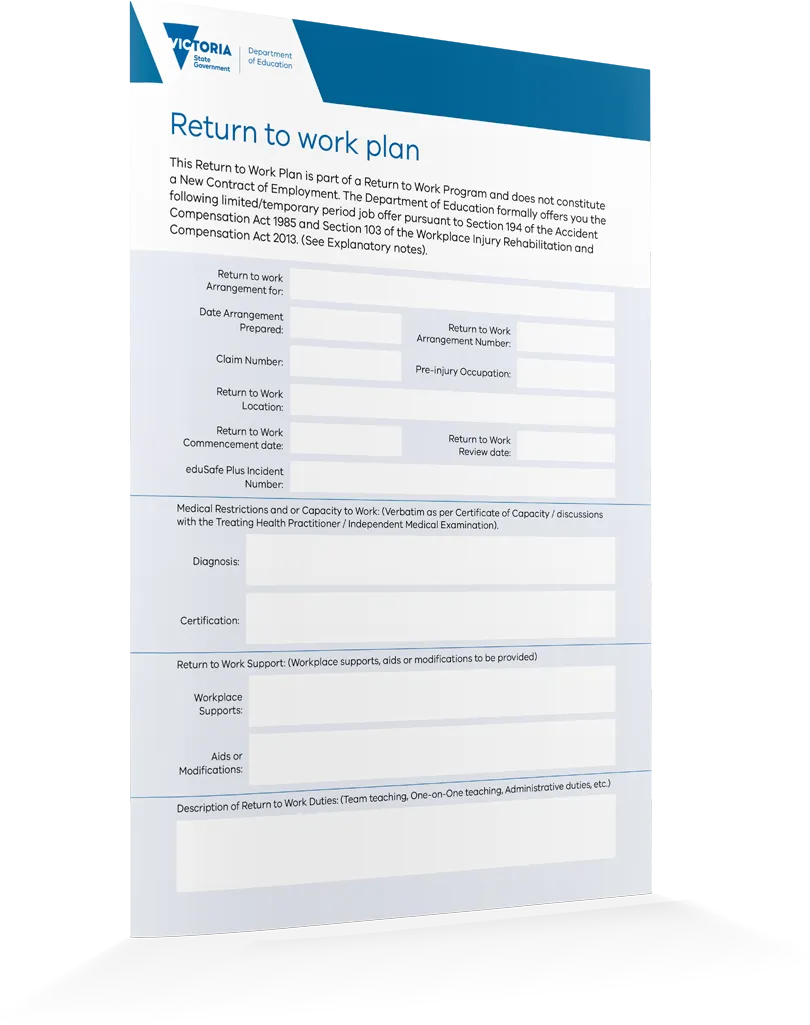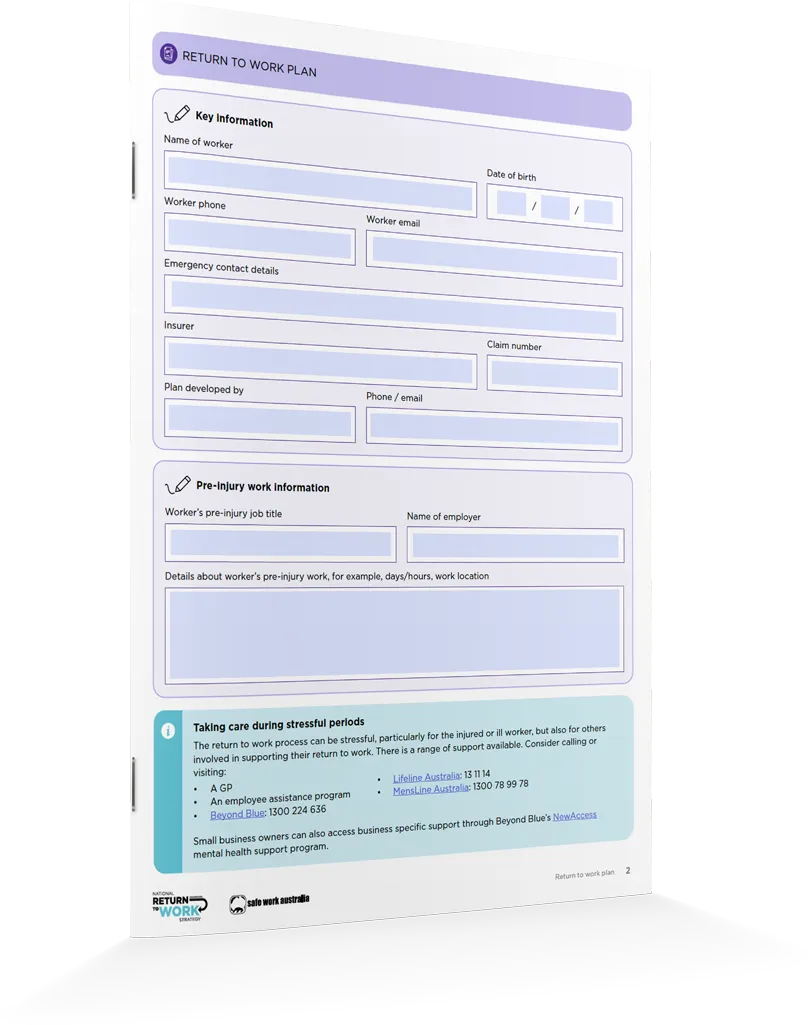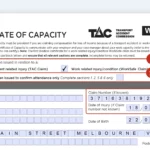Returning to work following a period of incapacity can be overwhelming. Under Victorian Workplace Injury Rehabilitation and Compensation Act 2013 legislation (WorkCover), both the employer and the injured worker have legal obligations to cooperate and make ‘reasonable efforts‘ to return the injured worker to work when it is safe to do so.
Quick Links
This includes participating in a return-to-work plan, making use of occupational rehabilitation services, participating in assessments, and participating in interviews with the authority/insurer (or self-insurer). If you do not participate in this process, it can impact your entitlement to weekly payments and lump-sum compensation in the future.
Your occupational rehabilitation provider or insurer are entitled to contact your treating practitioner via email or letter to seek an opinion as to any improvements you may be able to achieve with your work capacity. However, you and your treating practitioner are not required to meet with them to discuss this.
Examples of Return-to-work (RTW) Plans
NOTE
If you are unfit to perform any pre-injury or even modified duties, you are not required to return to work. However, you must continue to provide your employer with a Certificate of Capacity to reflect this. Please read our article, ‘Certificate of Capacity: Explained in Layman’s Terms‘ to learn more.
Related: WorkSafe – Information for Workers – Return to Work Obligations Information Guide
When you have an incapacity for work
You don’t have to be 100% recovered in order to return to work, but it’s important to know your responsibilities under the law to get back to work. These obligations are as follows:
- Participate in planning for return to work: You, as the injured worker, must make ‘reasonable efforts’ to actively participate and cooperate with your employer, Authority or self-insurer in planning to return to work.
- Use occupational rehabilitation services: You must also meet with occupational rehabilitation services to try to improve your condition.
- Participate in assessments: Upon your insurers (or self-insurers) request, and to the extent it is reasonable to do so, you must actively participate and co-operate in any assessments of your capacity to work at an independent medical assessment.
- Return to work: You must also make ‘reasonable efforts’ to return to work in suitable employment, or your pre-injury employment, at the employer’s place of employment or another place of employment.
- Participate in interviews: You must also participate in interviews with the insurer (or self-insurer).
NOTE
Failure to meet your obligations can lead to suspension of weekly payments or termination of compensation for non-compliance.
Under the Workplace Injury Rehabilitation and Compensation Act 2013, a worker’s entitlement to weekly compensation payments is contingent upon compliance with legal obligations under Division 3.
These include:
- Participate in planning for return to work
- Use occupational rehabilitation services
- Participate in assessments
- Return to work
- Participate in an interview
Failure to meet these obligations can result in suspension or termination of payments by the Authority, Insurer or self-insurer, following a structured process:
Notice
If you don’t comply with your return-to-work obligations, the insurer must put you on notice of this. They will give you a deadline by which you need to comply with your obligations, which is usually between 14 and 60 days.
Suspension
If you fail to comply by the deadline, your weekly payments may be suspended for up to 28 days (‘the suspension period’). If you comply within the suspension period, your payments will resume, but you will not receive back pay for any missed payments.
Termination
If you do not rectify the non-compliance within the suspension period, your weekly payments may be terminated. This must be done by written notice with reasons for the termination. If you have a history of non-compliance, it’s possible your entitlement to weekly payments will be permanently ceased.
It is important to ensure that you comply with your rehabilitation and employment obligations in a timely manner to avoid this scenario.
When you have been receiving weekly payments
A worker receiving weekly compensation payments has a legal duty to notify the relevant parties when returning to any form of work. These obligations are as follows:
- Notification to the Insurer/Authority: If a worker receiving weekly payments directly from the Authority returns to any form of employment—whether as an employee, self-employed, or otherwise—they must immediately notify the Authority of their return to work.
- Notification to the Pre-Injury Employer: If a worker returns to work with a different employer than the one where the injury occurred, they must immediately notify their pre-injury employer of their return, regardless of whether they are earning income.
If returning to work is not possible
In some circumstances, returning to work may not be possible for you.
For example, it may be the case that your workplace is unable to provide suitable work for you based on the restrictions outlined in your return-to-work plan or your injuries are too severe to work at all.
This may be because the work is highly strenuous by nature and cannot be modified in a manner that makes it safe for you to perform. However, before this conclusion is reached, the employer must ensure that they have considered all available light duties, including any office and administration work.
If your injuries are so severe that you cannot perform even modified duties you have an ongoing right to weekly payments under the rules of WorkCover. If that’s the case, you can continue to provide Certificates of Capacity to your employer and insurer for 130 weeks. Beyond this time, you must show that you have 21% whole-person impairment and no capacity for work to remain on weekly payments.
You may also be entitled to pursue lump-sum compensation, such as an impairment benefit claim and a common law claim for damages. There are also options to explore other insurers you may hold, such as insurance you hold under your superannuation.
Ending employment contract while still on WorkCover
For the first 52 weeks of a WorkCover claim, an employer has a legal obligation to offer suitable ‘modified’ duties to the employee, and they cannot terminate employment solely due to the injury or WorkCover claim. However, an employer can still terminate an employee on WorkCover if there are valid reasons unrelated to the injury or WorkCover claim, such as redundancy or misconduct.
After this period, if the employee remains unable to perform their pre-injury role, the employer can consider terminating employment, but they must establish that the employee’s incapacity is likely to continue for at least three months.
FAQs
No person, including vocational assessors, are allowed as a right into any private medical appointments that you would prefer to have one-on-one with your doctor. Should you not wish for a return to work officer or vocational assessor to attend a private consultation with your practitioner, you are entitled to refuse permission. While keeping with the obligations set out in the Act, workers are still free to talk confidentially and privately with their doctors about any return-to-work plan.
The insurer or vocational assessor are allowed to contact (via letter or email) your treating medical practitioner to seek an opinion on your ability to work.
In the context of workplace injury law, a worker is considered to be making reasonable efforts to return to suitable or pre-injury employment if they are actively engaged in returning to work.
This includes:
- Awaiting the commencement of approved rehabilitation services.
- Waiting for an employer’s response for suitable employment or pre-injury employment
- If an employer indicates that suitable or pre-injury employment may be provided at a future date, the worker is waiting for that employment to commence.
- If an employer confirms that they cannot provide suitable or pre-injury employment, the worker is then actively seeking a response from another employer regarding such opportunities.
Your employer is obligated to allow you to return to work with ‘reasonable adjustments’ within the first 12 months following your injury.
Your work capacity will be based on the opinion of any Independent Medical Examiner that you have attended, your Certificates of Capacity, and any rehabilitation consultants that you have attended. Any decision on your work capacity that you disagree with can be appealed to the Workplace Injury Commission.
Once you are deemed fit for work, your employer must develop a ‘return-to-work plan.’ The plan will be based on your deemed capacity and should contain details of the work you can perform, including any restrictions you have.
Once that return-to-work plan has been drafted, you and your doctor can propose modifications to it. It is important to remember that you are also entitled to suggest amendments or changes to your return to work program, however it is essential that you have your doctor’s support in any proposed alteration.
Once the 12-month period has ended, your employer is no longer obligated to allow you to continue working on modified duties. If, at this point, you cannot return to work on your pre-injury duties, your employer is permitted to terminate your employment, however they can continue to offer modified duties indefinitely if they are happy to.
Under the Victorian system, it is not a requirement to obtain a precise ‘return to work certificate’. However, it’s highly recommended that you obtain a Certificate of Capacity clarifying that you’re fit for modified OR full duties.
Yes!
Returning to work does not prevent you from exploring your other compensation options if you continue to suffer from a permanent impairment because of your injury.
You may be eligible for an impairment benefit, and you may have options to pursue a common law claim.
In most cases, a lawyer is not necessary during the RTW process if everything proceeds smoothly.
However, if a worker feels they are being treated unfairly or pressured to return to work before they are ready, they have the right to seek legal advice. Additionally, they may have a family member, friend, or other support person assist them throughout the process.
EXTRA SUPPORT
- If you’re looking for more information about your return to work obligations, please visit WorkSafe.vic.gov.au/return-to-work or call the WorkSafe Advisory Service on (03) 9641 1444.
- Alternatively, if you feel like your employer or Agent isn’t meeting their obligations, seek legal advice from our WorkClaim Lawyers at Arnold Dallas McPherson by calling 1800 242 588 for free. We’re available 24/7.
Seek Legal Advice

If you are at this stage of your journey, we encourage you to get in touch to speak with one of our personal injury lawyers to discuss your options.




















